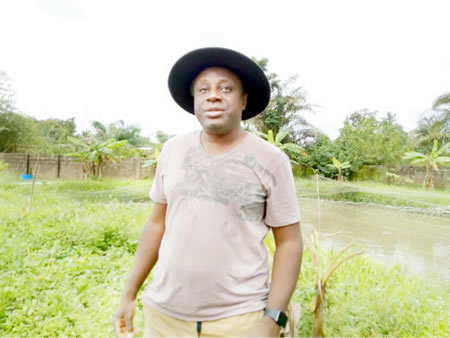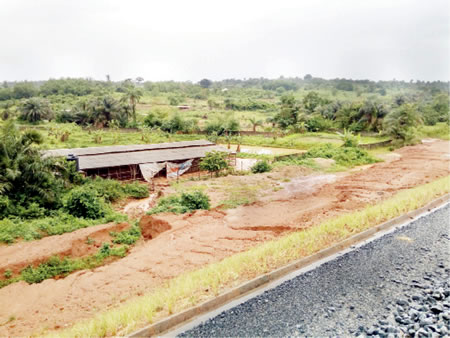Water channelled from the railway construction that passes through Elenusonso community, in Iddo Local Government area of Oyo State, has taken over farms in the area, wreaking havoc. YEJIDE GBENGA-OGUNDARE reports that farms in the area have been forced to close down following destruction by water.
When the people of Elenusonso community in Iddo Local government area of Oyo state heard the news that the Rail Modernization Project will pass through their community they were filled with joy that the community which is not far from the National Horticultural Research Institute (NIHORT) geographically but very far in terms of amenities and social infrastructure, will get a new lease of life.
To the people, it is a sign that the community will soon open up and bring with it development and an improvement to the socioeconomic life of the people. But as the tracks are being laid, many of them have had a change of heart about the project.
JUST IN: Why our helicopter ‘picked up sick person’ on Benin-Ore road after security clearance — TAC
Rather than the joy of development that they envisaged, many have lost their source of livelihoods; the erection of the rail track has tampered with the flow of water and water from the area is now channeled into particular areas, destroying farmland, businesses and homes.

Like wildfire, the damage done by the channelled into particular areas of the community is unquantifiable; worse hit is a farm called the D.I.O.S Farms, which is directly beside the track; it bears the brunt of the damage as the water brings down its fence and penetrate the farm, wreaking havoc and leaving destruction in its wake.
Though the environment itself is water logged and there are many factors which can cause flood, human interactions has made life unbearable for the affected parts in the community; the erection of the rail track and the dykes made by the construction company has diverted every source of excess water into the farms and homesteads, causing incessant flood and massive loss.
In the community, large sediments and clay from the construction were transported by water, blocking up fish ponds; the flood water has caused huge erosion and created deep gullies in the area while the land is marshy and difficult to walk in. Farmsteads and buildings have been weakened and some are falling apart; furniture has been ruined, floors and walls are damaged and most buildings in the path of the water are giving signs of defection.
For farmlands like D.I.O.S, the loss goes beyond furniture and weakening of structures, the farm has lost crops, its banana plantation is in shambles, poultry birds have all died from flooding, fishes in the three massive ponds have been washed away, the piggery has been destroyed by water while more than half the cows and rams have died from water invasion. Properties in the staff quarters have been destroyed and operation has ceased. This is because the fence of the farm continues to collapse from the onslaught of the water and every asset has been destroyed with virtually all the animals being reared carried away by water while the rest drowned.

Also, the affected area is filled with debris and the people are afraid of the hazard the debris poses for their lives and the effect of erosion on the community, which is now filled with various sizes of gullies.
Speaking with Nigerian Tribune, Mr Oladokun Yussuf, a farm worker, stated that the area never experienced any form of flood before the rail track construction commenced, adding that he has lost his job due to the hazard wreaked on businesses and farms in the area by water from the railway under construction.
“I am a farm worker and I have been here for years but now I do not have a job again because the farm where I work has closed down due to the way water passed from the rail track, invaded the farm and killed all our animals, even the house we stay was not spared; all fishes and hens were killed while some the fishes were washed away. See the way the sand brought has covered every fish pond.
“Before they started construction, nothing like that happened, our boss used to reconstruct the fence anytime the water brought it down but it seems a waste because few days after, another side would collapse due to the water. We went to talk to the people working there to help us channel the water away from our farm but the Chinese people pretended not to understand English Language while the Nigerians there told us it is not in their power. So, the situation remains the same and because government wants to construct railway now, they have destroyed lives and businesses,” he stated.

Also speaking, Reverend Olubukola Fajinmi, a missionary farmer and owner of D.I.O.S Farms, stated that the problem faced by residents and businesses in that part of Elenusonso is mainly from a particular source; the ongoing railway construction, adding that the farm has lost averagely N60m since the flood issue started.
“D.I.O.S is a missionary farm which we use to help churches around here; we have been having a smooth operation for years before the commencement of the rail track here. The railway from Abuja to Lagos cuts through this community and that is the genesis of our problems; the construction engineers just commenced work without any plan or provision for any canal or drainage system for the water they have channelled from where they are working.
“The consequent flood has destroyed my farmland and broken my perimeter fence thrice. We haven’t been working for months and I am not the only one affected, you can see that other farms are also in the same boat, they have also experienced various levels of destruction, my own is just worse because it is the nearest and is like a kind of border between other farms and the track. After paying my workers for some months without being able to do any work since the water continues to kill our livestock, I had to lay them off,” he explained.
When asked how much he had lost as a result of the flood, he estimated an average of N60m. “This has cost me so much, where do I start? In terms of structural damage, we will be looking at around N30m; I had to reconstruct that fence thrice before I gave up, what of the structures inside, everything has been destroyed, the chicken pen has been taken over by mud and silt, I do not have fishes in all the ponds again, everything has been washed away, the cows are all gone because of too much water.

“Then, if I talk in terms of revenue I have lost in six months, what we would have made from the sale of hen, fishes and other income will averagely be another N30m. how do I meet up, where do I make back that kind of money. Yet, this is not over, so it is impossible to start afresh when the problem still exists,” Revd. Fajinmi explained.
He, however, did not just fold his arms too, he made efforts to contact the construction company in a bid to rescue his business from collapse but nothing came out of his efforts. He said, “I tried to speak with the company constructing the track without success. I even had to employ the services of an attorney but the Chinese firm said it is not their responsibility. So we are just here, suffering unduly for something that could be avoided with good planning.”
Nigerian Tribune tried to speak with workers on the rail construction site but no one except the menial labourers, was willing to talk. And though they agreed that they could see the harm done by water running into the community, they are not in the position to say anything or take any decision because, “a contractor brought us here to work. If they don’t see us tomorrow, no one cares, they will only call the contractor to supply others,” one of them said.
Another farm worker identified as Yakub called on government to wade in and take care of its people because “it is the responsibility of government to protect its people if the construction company is doing something wrong. Can the Chinese people do that in their country? The government should not allow them destroy our lives because they are working for government.”
Nigerian Tribune got the views of the spokesman, Western District of the Nigerian Railway Corporation (NRC), Mr. Callistus Unyimadu, who explained that until the China Civil Engineering Construction Corporation (CCECC) hands over the project to the NRC, there is little or nothing the corporation can do.
He acknowledged the fact that the construction works have affected some communities in Ogun and Oyo States but advised affected communities to approach state offices of the CCECC to express their grievances as the project is still under the control of the CCECC.
“They are yet to finish construction works and until they finish construction works and hands over to NRC, the corporation cannot do anything about affected communities,” Unyimadu stated.
However, all efforts to get any representative to speak on the issue on behalf of the CCECC in Ibadan was unfruitful.




